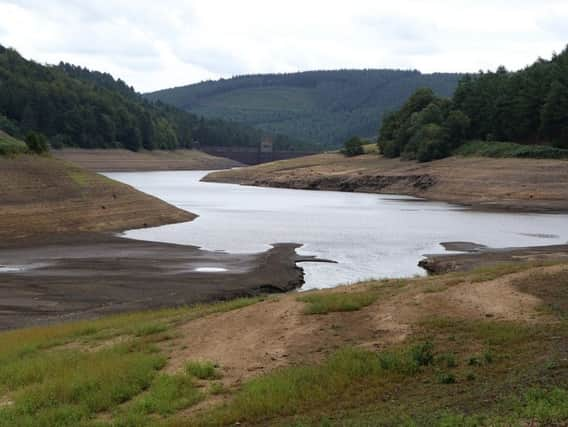Barbecue weather 'could heap trouble' on farms still suffering from last summer's drought-like conditions


Water abstraction licence restrictions have been put in place by the Environment Agency in catchment areas of the River Swale in the northern Yorkshire Dales to Boroughbridge, the River Seven in the North York Moors and Cod Beck from Osmotherley to Thirsk.
Rainfall has been low across Yorkshire so far this month, at a time of the year usually associated with frequent showers, and Yorkshire Water reported that some of the region’s rivers were at “below critical level” by the end of March.
Advertisement
Hide AdAdvertisement
Hide AdThe situation is no cause for panic but a cue for farmers to plan ahead, said James Copeland, senior environment and land use adviser at the regional branch of the National Farmers’ Union.
“It’s fair to say the impact of the dry weather last summer hasn’t gone away for our members and businesses, and they are keeping a very close eye on the current weather conditions,” he said.
“If we continue to have great weather for barbecues, it could put a number of farmers in a difficult situation.
“There is some moisture out there; things are starting to grow; farmers can get onto the land, it’s not flooded; and they can get any spring cropping and care processes done to keep crops healthy and safe; but at the same time, they are keeping a close eye on what they can do.”
Advertisement
Hide AdAdvertisement
Hide AdThe lack of rainfall last summer hit grass growth, causing a tight supply of fodder and therefore higher prices, and as reported in The Yorkshire Post earlier this week, some farmers have already made contingency plans ahead of this summer.
Mr Copeland encouraged farmers to plan ahead, saying: “A lot of our members will have taken steps to manage risk because they have already got their crops in the ground but it is a good opportunity to reassess what your current cropping patterns are, not just arable and horticultural, but livestock as well.
“If livestock farms go into the summer not looking great, the farmer could consider setting up contracts for buying in feed, but we are in the ‘let’s plan’ phase rather than ‘react’.”
In North Yorkshire, Andrew Wilson, who farms on the Castle Howard estate, was informed that local river levels are approaching threshold levels for abstraction restrictions as he reached the halfway point of planting his spring potato crop this week.
Advertisement
Hide AdAdvertisement
Hide AdHe said he hoped to avoid a repeat of last year’s drought-like conditions, saying any similar prolonged dry spell would have a “significant” effect on his business.
“Last year we saw a 300 per cent difference in yields between the best and worst potato crops,” Mr Wilson said. “In some fields we were down to nine-tonne an acre and we were significantly down on our usual average.
“This year, I’ve been trying not to put too much of the crop up front so we don’t lose all the moisture in the ground.”
According to the NFU’s Mr Copeland, there has been an increase in the number of abstraction restrictions imposed by the Environment Agency in recent years, and such measures had come earlier in the season this time round.
Advertisement
Hide AdAdvertisement
Hide AdA spokesman for the Environment Agency said the measures were necessary.
“If there is a lack of available water we are willing to review the situation, but it is important that we abide by the standards in place to protect the environment and other abstractors,” the spokesman said.
“The Environment Agency updated its flexible abstraction position in February which included the option for farmers to refill winter storage reservoirs beyond the end of March subject to water being available, at no extra cost. However, given the dry end to March and predominantly dry weather so far in April some licences may not be able to abstract because river flows are below ‘hands off flow’ conditions.”
Earlier this week, Paul Hammett, the NFU’s national water resource specialist, said it was “of concern” that abstraction restrictions had been put in place so early in the year.
Advertisement
Hide AdAdvertisement
Hide Ad“It’s going to be quite challenging for farmers to manage their available water to make sure they can make it last as long as possible to manage crop needs,” Mr Hammett said.
“We’ve found that a high proportion of the farmers that we’ve spoken to, in terms of irrigated cropping, are increasing their storage, looking carefully at their cropping plans and are looking to trade water with other farmers.
“So we’re looking at a number of options to try to limit the risk of water shortage,” the union’s water expert added.
Other parts of the country have experienced similarly low levels of seasonal rainfall through March and the start of April.
Advertisement
Hide AdAdvertisement
Hide AdAccording to the National River Flow Archive, which collects UK river flow data, groundwater levels were below normal in central and eastern England, most notably in East Anglia.
The Met Office reported “low confidence” in the forecast for the end of April, though some showers and longer spells of rain are expected.
The outlook for the start of May is similarly uncertain but temperatures are predicted to be “mostly above average”.